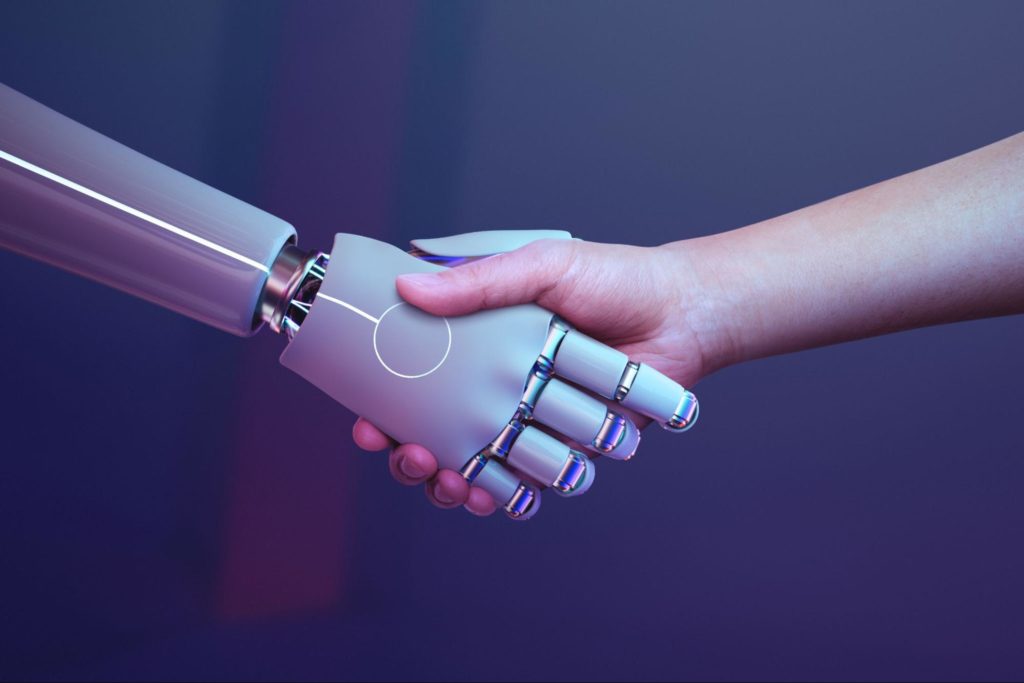By Erika Koutroumpa,
Artificial Intelligence (A.I.) is the latest buzzword to be thrown around in all sectors, especially due to the digitalization of our daily lives during the COVID era onwards. What was invented in the 50s is now taking new dimensions, proving to be a boon to mankind with its plethora of applications to everyday life. It helps make everything faster and more efficient, from sorting out paperwork to solving complex logistical issues. A research area of particular interest seems to be the application of A.I. in the field of medicine.
This type of mechanism can be split into two broader groups, one which includes physical applications such as robots used for surgeries and smart prosthetic devices, and the other concerning the numeric use of A.I., namely applications and websites that can be used to streamline medical services. A.I. can nowadays diagnose, improve patient-doctor communication, transcribe documents, and even be used to treat patients remotely. Nowadays, the focus is on how all this can be used to get the “right patient to the right doctor at the right time”. It can prove to help increase staff efficiency, improve the quality of care, and optimize resources.

How do A.I. apps work? Programs used in the medical field are not dissimilar to standard applications in other sectors. The lion’s share of algorithms is trained using machine learning, usually tasked to handle large datasets, including images, to make connections and recognize patterns based on existing knowledge. Hence, this is why healthcare A.I. can successfully diagnose conditions requiring visual comparisons. The database used for its initial operation can also be enriched by retaining images and information from previous cases, usually to help improve its function and monitor for errors.
The most recent vast application of A.I. was during the COVID-19 outbreak via contact tracing. Through this, governments can contact people who have interacted with someone exposed to the virus and instruct them to quarantine. There are also companies specializing in outbreak software, accurately predicting the global spread of COVID in 2019. This was achieved by using machine learning and natural language processing to analyze various data, from scientific papers to travel itineraries, to predict the trajectory of the spread of an infectious disease.
A.I. has proved to be a boon to mankind by helping automate different daily life processes, creating the fear that doctors will soon be replaced by software. An example of this is that the father of A.I., Geoffrey Hinton had predicted that radiologists would be replaced by machine-learning tools. However, this is not going to be happening anytime soon. Most of the time, these programs are not created by doctors for doctors, but by people who do not know anything about medicine. Hence, clinicians should collaborate with programmers and point them in the right direction, but until then there is a very slim chance that a program will manage to provide us with a sufficient diagnosis. Nevertheless, being able to integrate new technologies can be great for confirming a differential diagnosis and is considered an advantage for a modern-day doctor.
At the same time, a factor that needs to be considered is the patient’s stance towards artificial intelligence. 60% of Americans would feel uncomfortable if the physicians diagnosed their condition relying on A.I., worrying that it would make the patient-provider relationship worse. In comparison, only a 38% portion thought that novel technologies could lead to better treatment outcomes. Due to the current lack of population-representative data, current A.I. seems to have a bias against female and ethnic minority patients, which seems to validate patient concerns until improvements in data collection are made.

Another big issue is patients’ data privacy. As mentioned before, companies rely on data from previous cases to create and then improve their algorithms. Since the online tools not only memorize but also retain data, there is a risk of sensitive data exposure (but also from third-party vendors exposed to data breaches as per usual). According to calculations by IBM, healthcare seems to have the most expensive data breaches, with an average cost of 10.93 million USD.
To conclude, the further use of artificial intelligence seems to be an exciting prospect that may be closer to us than anticipated. Despite its great potential to improve the quality of care, we need to remember that with great power comes great responsibility. Hence, before being adopted by a wider audience, significant pitfalls of this technology need to be addressed, such as the risk of data breaches and discrimination by the algorithm against minority populations. One thing is for certain though; machinery will not replace human doctors anytime soon.
References
- Understanding the advantages and risks of AI usage in healthcare. Reuters. Available here
- Artificial Intelligence in Medicine: Applications, implications and limitations. Science in the News. Available here
- Amisha, Malik P, Pathania M, Rathaur VK. “Overview of artificial intelligence in medicine”. J Family Med Prim Care. 8(7). p 2328-2331.




